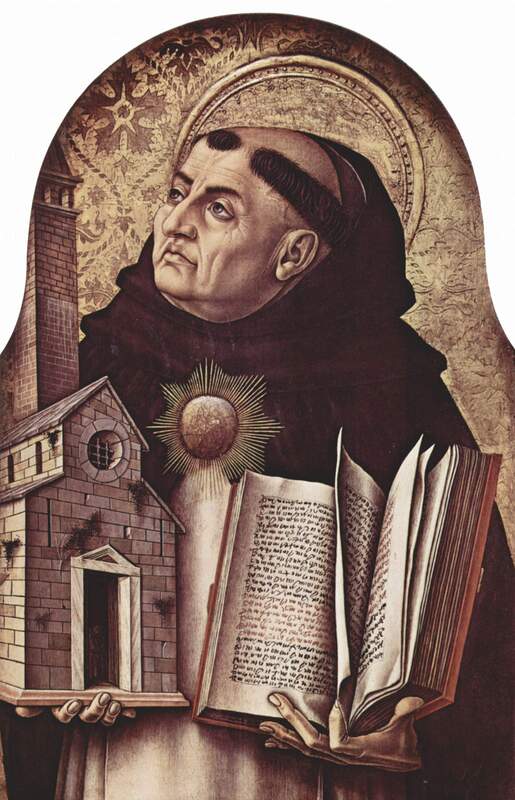Thomas Aquinas
|
Saint Thomas Aquinas (1225 – 1274) St. Thomas Aquinas was a true son of St. Dominic. His study and teaching have been a priceless gift to the Church. Thomas, the son of Italian nobility, was born in the family castle of Rocca Secca north of Naples in about 1225. While a student at the University of Naples, Thomas met the friars and received the habit. Thomas’ family, preferring him to have the powerful position of abbot of the Benedictine Abbey of Monte Cassino rather than the life of a begging friar in a humble new Order, kidnapped and imprisoned him until he would change his mind. Thomas’ brothers even sought to destroy his vocation by sending a woman to seduce him, but the young man drove the seductress from his cell with a flaming torch, then knelt and prayed for deliverance from all temptations against chastity. In answer to his prayer, God sent angels to minister to Thomas and to gird him with a cincture of perpetual chastity.
After a year’s imprisonment, Thomas escaped with the help of his sisters and returned to the Dominicans. Following a period of formation and study at Cologne and Paris under the tutelage of St. Albert the Great, Thomas began his life’s work of teaching and writing. He taught at universities and Dominican houses in Paris, Rome and Naples. His written works include commentaries on the Sacred Scriptures and the works of Aristotle, the Summa Contra Gentiles (an apologetic work aimed at the Muslims), and his best known work, the Summa Theologica (a work giving the theological foundation of the truths of the Catholic Faith). In medieval Europe, all learning took place under the eye of the church, and theology reigned supreme in the sciences. Still, non-Christian philosophers like Aristotle the Greek, Averroes the Muslim, and Maimonides the Jew were studied alongside the Bible. Scholars were especially fascinated by Aristotle, whose works had been unknown in Europe for centuries. He seemed to have explained the entire universe, not by using Scripture but by his powers of observation and reason. This emphasis on reason threatened to undermine traditional Christian beliefs. Christians had believed knowledge could come only through God's revelation, that only those to whom God chose to reveal his truths could understand the universe. How could this be squared with the obvious knowledge taught by these newly discovered philosophies? At the beginning of his massive Summa Theologica (or "A summation of theological knowledge"), Thomas stated, "In sacred theology, all things are treated from the standpoint of God." Thomas proceeded to distinguish between philosophy and theology, and between reason and revelation, though he emphasized that these did not contradict each other. Both are fountains of knowledge; both come from God. Reason, said Thomas (following Aristotle), is based on sensory data—what we can see, feel, hear, smell, and touch. Revelation is based on more. While reason can lead us to believe in God—something that other theologians had already proposed—only revelation can show us God as he really is, the triune God of the Bible. Thomas, however, would not necessarily be pleased. Toward the end of his life, he had a vision that forced him to drop his pen. Though he had experienced visions for years, this was something different. His secretary begged him to start writing again, but Aquinas replied, "I cannot. Such things have been revealed to me that what I have written seems but straw.” A gentle, humble man, St. Thomas had a deep devotion to the Cross of Christ. He said that he had learned more from the crucifix than from any book. He began all his works in prayer at the foot of the Cross. In his brief life (he was only about fifty years old when he died), St. Thomas left a treasury of wisdom and learning for the Church, for which she has honored him with the title “Angelic Doctor.” Both the Council of Trent and the Second Vatican Council relied on and explicitly mentioned his works, especially the Summa Theologica. One of the 33 Doctors of the Church, he is considered by many Catholics to be the Church's greatest theologian. |
Quotes
|
When the devil is called the god of this world, it is not because he made it, but because we serve him with our worldliness.
-Thomas Aquinas If the highest aim of a captain were to preserve his ship, he would keep it in port forever. -Thomas Aquinas Give us, O Lord, grateful hearts, which do not waste time complaining -Thomas Aquinas "In order that men might have knowledge of God, free of doubt and uncertainty, it was necessary for divine truth to be delivered to them by way of faith, being told to them as it were, by God himself who cannot lie.” -Thomas Aquinas |


